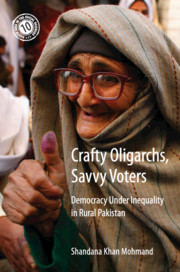Crossref Citations
This Book has been
cited by the following publications. This list is generated based on data provided by Crossref.
Ali, Sameen A. Mohsin
2020.
Party patronage and merit-based bureaucratic reform in Pakistan.
Commonwealth & Comparative Politics,
Vol. 58,
Issue. 2,
p.
184.
Ali, Sameen A. Mohsin
2020.
Driving participatory reforms into the ground: The bureaucratic politics of irrigation management transfer in Pakistan.
World Development,
Vol. 135,
Issue. ,
p.
105056.
Javid, Hassan
2021.
The Limits of Possibilities of Religious Politics: The Case of the Tehreek-i-Labbaik in Pakistani Punjab.
Sociological Bulletin,
Vol. 70,
Issue. 4,
p.
502.
Hassan, Bilal
2021.
Social Basis of Democratic Legitimacy in Pakistan.
SSRN Electronic Journal ,
Haider, Erum A.
2021.
Democracy under duress: patronage, class and the Pakistani voter.
Commonwealth & Comparative Politics,
Vol. 59,
Issue. 2,
p.
215.
Berenschot, Ward
Capri, Wigke
and
Dhian, Devy
2021.
A quiet revolution? Village head elections and the democratization of rural Indonesia.
Critical Asian Studies,
Vol. 53,
Issue. 1,
p.
126.
Ali, Sameen A. Mohsin
2022.
Networks of Effectiveness? The Impact of Politicization on Bureaucratic Performance in Pakistan.
The European Journal of Development Research,
Vol. 34,
Issue. 2,
p.
733.
Golden, Miriam A.
and
Nazrullaeva, Eugenia
2023.
The Puzzle of Clientelism.
Aftab, Muhammad Yahya
and
Ali, Noaman G.
2023.
Agrarian change, populism, and a new farmers' movement in 21st century Pakistani Punjab.
Journal of Agrarian Change,
Vol. 23,
Issue. 1,
p.
85.
Anderson, Colin
Joshi, Anuradha
Barnes, Katrina
Ahmed, Affaf
Ali, Muddabir
Chaimite, Egidio
Forquilha, Salvador
Khan, Danyal
Khan, Rizwan
Loureiro, Miguel
Posse, Lucio
Rowlands, Jo
and
Shankland, Alex
2023.
Everyday governance in areas of contested power: Insights from Mozambique, Myanmar, and Pakistan.
Development Policy Review,
Vol. 41,
Issue. S1,
Malik, Rabia
2023.
Lesser of Two Evils: Allocating Resources to Opposition Districts in Pakistan.
Legislative Studies Quarterly,
Vol. 48,
Issue. 2,
p.
241.
Auriol, Emmanuelle
Platteau, Jean-Philippe
and
Verdier, Thierry
2023.
The Quran and the Sword.
Journal of the European Economic Association,
Vol. 21,
Issue. 5,
p.
1772.
Jan, Muhammad Ali
2023.
Lineages of the ‘labour question’: from ‘subaltern workers’ to ‘classes of labour’ in the Punjab canal colonies.
The Journal of Peasant Studies,
Vol. 50,
Issue. 7,
p.
2723.
Amirali, Asha
2024.
A Case of Rampaging Elephants: The Politics of the Middle Classes in Small-Town Pakistan.
Journal of Contemporary Asia,
Vol. 54,
Issue. 2,
p.
299.
Jan, Muhammad Ali
2024.
The Social Origins of Capital: Trajectories of Accumulation at the Rural–Urban Interface in Pakistani Punjab.
Journal of Contemporary Asia,
p.
1.





